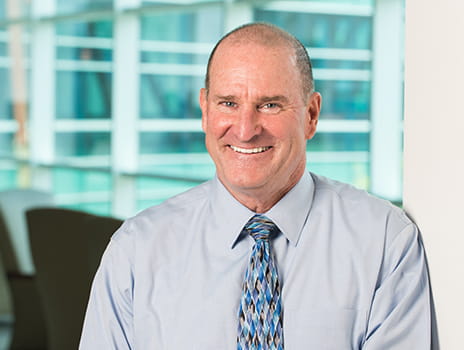Wholehearted Recovery from an Aortic Aneurysm


November 06, 2018
At 59, Rich McArdle felt great, worked out and was at a healthy weight. But when he went in for his yearly physical, he found out he wasn't fine. His EKG showed a slight abnormality that led to the discovery of an aneurysm of the ascending aorta. In other words, there was a thin spot on the major artery running through his body. If it ruptured, his life would be in severe danger.
"I thought the doctor was kidding when he told me I was going to have open heart surgery to fix it," says McArdle. "I had no idea I was so sick." McArdle has an indirect family history of heart disease, but he hadn't experienced any symptoms to indicate he would become a victim of his genetics.
After speaking with a few friends and his primary care physician, McArdle was on the phone with Greg Muehlebach, MD, a cardiothoracic surgeon at The University of Kansas Health System. "As soon as we started to talk, I felt a connection and knew he was the doctor I wanted. He's a dynamite guy and has a great bedside manner," says McArdle.
After his open heart procedure, McArdle spent 8 days in the hospital and at least another 2 months "on the bench."
"I was so impressed with everyone at The University of Kansas Health System," he says. "From the doctors and nursing staff, to those who handle billing questions – all are top-notch and care about you as an individual."
McArdle spent a good portion of his recovery in the health system's cardiac rehab program.
"Although they were very welcoming, the program is pretty intimidating," admits McArdle. "It's difficult to ask for help, which is what you have to do. The entire experience taught me a great deal of humility and patience. They helped me get back into shape, without going overboard, which I have a tendency to do."
Rich was described as a go-getter from the start by those who ran cardiac rehabilitation. He was very responsive and understanding of why he had to learn to pace himself and took the tools presented for his recovery with open arms.
I wanted them to see how well their efforts paid off in getting me back to work and able to enjoy life again. – Rich McArdle
During his recovery, McArdle also used the White Heart Learning and Resource Center, a place where patients and their families can learn about the heart and the importance of heart health. There, he met coordinator Pat Twenter.
"From the first moment I met Rich, it was perfectly clear that he would do very well with cardiac recovery," says Twenter. "He and his brother came to the White Resource Center for coaching on cardiac surgery recovery. Rich's first comment was, 'I want to do my part in making my surgery a success!'"
McArdle is grateful for the assistance Twenter provided. "She guided my brother and me in getting my medications balanced out and taught me about other resources available. I learned that there was also an emotional side of this experience, which was huge for me. She helped me to see that I needed to be patient."
Now fully recovered, McArdle is active in the community. He keeps busy with his 4 children, a board position with Welcome House and as director of sales for Chiefs Radio Network. He recently competed in the Shawnee Mission Mini Triathlon as a way to thank his care providers at The University of Kansas Health System.